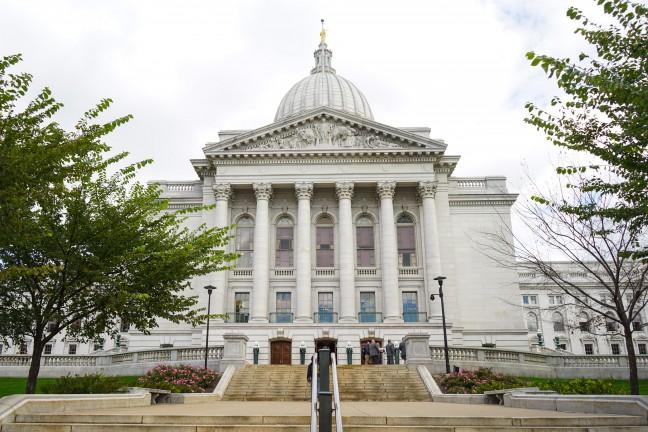Gov. Tony Evers delivered his $91 billion budget proposal for 2021 to 2023, named the “Badger Bounceback Agenda,” Tuesday night.
In his address to the legislature, Evers said he put the budget together with the help of people across Wisconsin with the state’s post-pandemic future in mind. The total $91 billion two-year state budget plan would raise the budget by 7.3% the first year and 2% the second year.
“As both a state and a country, we find ourselves with a decision to make,” Evers said. “When this pandemic is over, we could go back to the way things have always been, or we can take this moment to demand the future we dream.”
Evers opened by discussing his plans for education, stating every child in the state should have access to high-quality, public education. The budget allots $140 million aiming to increase equity and access to quality early education and the childcare system, supporting kids and caretakers.
For the second budget in a row, Evers proposed Wisconsin deliver on its promise for two-thirds state funding for schools, claiming this commitment should not be sidelined by politics. The budget included an increase to special education funding from $95 million to $709 million, as well as a call to invest $20 million in rural school districts.
“Investments will not only enhance direct support to some of our vulnerable students, but provide schools with the budget flexibility to fund things like mental health services, keeping buses running, tech and other critical needs,” Evers said.
Evers also acknowledged higher education is a driving economic force for Wisconsin, as it generates billions of dollars of economic activity in the state, creates jobs and prepares students to enter the workforce. Evers plans to maintain the Wisconsin tuition freeze — continuing the longest-running tuition freeze in the country.
The budget would invest $190 million into the UW system over the next two years to sustain the tuition freeze and cover pandemic-related losses. The budget also intends to expand the University of Wisconsin-Madison’s Bucky’s Tuition Promise to all UW System campuses, making four years of college free for students of lower-income households.
In a statement, UW-Madison Chancellor Rebecca Blank thanked Evers for recognizing and rewarding the UW System’s contributions to the state’s welfare and economic development.
“New investment in UW–Madison and other campuses means greater access to a college degree for Wisconsin high school graduates, a better educational experience for those who come here, more life-changing research and expanded outreach to all corners of our state,” Blank said. “This investment would help us recover from the effects of the pandemic more quickly and return to the classroom this fall.”
The Badger Bounceback Agenda also includes plans to adapt the Wisconsin criminal justice system.
Evers proposed investing in smaller, community-based correctional facilities, stating overcrowded prisons would cost Wisconsinites more tax dollars long term. He also proposed the juvenile justice system treat youth under 18 as kids — not adults.
“We can’t keep doing things the way we’ve always done if we want to bounce back and better than we were before this pandemic hit,” Evers said. “That’s why our Badger Bounceback agenda is about investing in people, not prisons.”
The budget would also close the Lincoln Hills and Copper Lake youth prisons and invest nearly $9 million in a pilot program to give certain youth offenders evidence-based treatment services. An additional $15 million would be allotted to expand the Treatment Alternatives and Diversion programs.
The budget also addressed climate change and Wisconsin’s commitment to be 100% carbon-free by 2050. The Badger Bounceback Agenda would double the required utility company contribution to the Focus on Energy Program, which would bring in an additional $100 million to improve the energy efficiency of buildings.
A new $20 million energy-efficient grant program would be created for schools to upgrade their infrastructure and reduce energy usage. An additional $1 million would be invested in the Fast Forward program to encourage Wisconsinites to work in clean energy and conservation by providing training for green jobs.
“We embrace a future where we don’t have to choose between mitigating climate change and protecting our environment and good-paying jobs and economic development,” Evers said.
City council passes mayor’s budget, votes to not accept additional funding for MPD
More than $329 million would go into new economic development initiatives. Evers proposed more than $29 million to fund workforce development initiatives. $200 million would aid small businesses hurt during the COVID-19 pandemic and a $100 million venture capital fund would help new startups.
Evers urged the Wisconsin Legislature to consider the budget proposals carefully in order to help Wisconsin recover from the pandemic.
“Each time a bill fails to pass, each time a compromise ends up in flames, each time legislators lose sight of the people who sent you here, the disappointment, the resentment and the disparities grow,” Evers said. “We must be unafraid to agree, unwilling to wait and unabashed about the work we have before us.”














